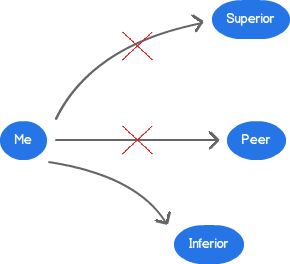The look on his face said it all. A stiletto tongue emerged from his rage contorted countenance, launching a barrage of words accusing me of misinterpreting, badmouthing and misjudging. Words designed to stab the heart and twist hard. Words designed to shift blame and attention away from the issue at hand to protect a vulnerable ego.
I’m sure almost everyone has experienced something like this. You have someone’s best interests at heart. You notice something they did wrong, which damaged themselves and hurt others, indicating a deeper problem in their lives. You want to help correct them, but three barriers keep you from diving in.
First, you wonder whether or not you rightly appraised the situation.
Did I misunderstand that e-mail? Maybe it sounded mean to me, but the others found it funny. Maybe I should be more understanding since he was tired from staying up all night.
Once you get over all the possible excuses and decide you care enough to bring it up, you think about what to say.
What if they take it the wrong way? Maybe I should overlook the problem–it’s not worth the trouble.
You dither between taking action and leaving well enough alone. You wrestle through every word to say and then go overboard trying to address every possible objection. Eventually the mental chess softens your arguments like Downy and you have a sweet-smelling, fluffy rebuke, but fall asleep exhausted before you can deliver it.
In the deep of the night, your heart psyches itself out on the third question.
Who am I to rebuke my friend about this? Why should he listen to me? He’ll probably bring up stuff I’ve done wrong in the past. Maybe I should just ignore the problem since I’m not one to talk.
Come dawn, the anxieties wear you down and you choose to pretend like nothing happened. No conflict, everybody is happy (at least on the surface) and you didn’t have to do a thing :).
This has happened in my life more times than I can count, even though I know the frequent exhortations of Scripture:
Better is open rebuke than hidden love. Wounds from a friend can be trusted, but an enemy multiplies kisses (Proverbs 27:5-6)
Those whom I love I rebuke and discipline. So be earnest and repent. (Revelation 3:18-20)
Preach the word; be prepared in season and out of season; correct, rebuke and encourage—with great patience and careful instruction. (2 Timothy 4:2)
It is better to heed the rebuke of a wise person
than to listen to the song of fools. (Ecclesiastes 7:5)Whoever rebukes a person will in the end gain favor
rather than one who has a flattering tongue. (Proverbs 28:23)So watch yourselves. “If your brother or sister sins against you, rebuke them; and if they repent, forgive them. (Luke 17:2-4)
 Most of the time, I am okay rebuking a little kid when I see him do something wrong, but when it comes to peers or superiors, I would rather keep my mouth shut than endure the consequences of calling out problems I see. It’s a lot easier to whine to sympathetic friends since feeding the gossip monster is far safer than risking a friendship or taking the heat for rebuking someone in power.
Most of the time, I am okay rebuking a little kid when I see him do something wrong, but when it comes to peers or superiors, I would rather keep my mouth shut than endure the consequences of calling out problems I see. It’s a lot easier to whine to sympathetic friends since feeding the gossip monster is far safer than risking a friendship or taking the heat for rebuking someone in power.
When we forget that God alone can change a person’s heart we agonize over our responsibility to rebuke and preemptively give up because we feel powerless to guarantee a positive response. This anxiety often expresses itself in sympathy seeking gossip. When we ignore the fact that God commands us to rebuke and restore, we may only pray about the problem, expecting God to fix it for us and so continue in a passive-aggressive holding pattern without ever taking the actions that God prescribes for healing the relationship. Thus we have the vicious cycle of courage burying anxiety producing despair-fueled laziness.
Instead of giving practical advice on “10 ways to be an awesome rebuker” or “20 tips for making your friends listen to you” let’s see what a biblical view of God’s sovereignty and human responsibility can do for us (I’m totally preaching at myself here). God is in full control of every human being, including wayward friends/leaders. This is a big relief since we know that it’s his place to change them, not ours, and when he chooses to do so, it never fails. Even so, God holds us responsible to speak the truth in love, which inevitably includes upbuilding rebukes (pretending like nothing is wrong, is a form of lying!) because that is how He planned to grow his children to maturity. Since God’s plan cannot fail, our efforts to follow him in this matter are guaranteed to grow his children to maturity as well.
So instead of succumbing to anxiety or despair, let’s make rebukes a healthy part of our relationships with superiors, peers and subordinates. If a person responds poorly, we discover early that we may need to follow the advice of Proverbs 9. If the person responds well, our relationship can only get stronger.
If you’ve had a difficult situation confronting people you care about, please share about it in the comments. Thanks!
PS, I found Pastor Sam Crabtree’s book Practicing Affirmation a helpful balance to these thoughts on rebuke. He recommends an “affirmation ratio” of 10 affirmations for every rebuke you give a person to demonstrate that the rebuke is truly given in love. (Note: this is an affiliate link, so I benefit if you buy the book through this link).

October 9, 2012 at 4:45 pm
“Even so, God holds us responsible to speak the truth in love, which inevitably includes upbuilding rebukes (pretending like nothing is wrong, is a form of lying!)”
To go off on that to find the gravity of it: Proverbs 10:18 (ESV) – “The one who conceals hatred has lying lips…” This may go for enemies, but it can also go for friends. In my experience when I act like nothing is wrong bitterness and hatred tend to take hold in my heart.